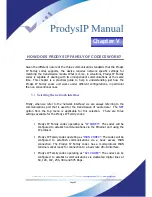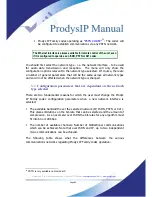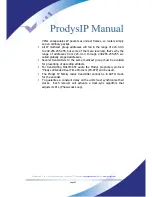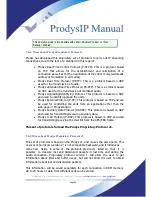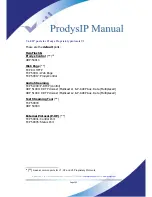
Prodys S.L. Tel: +34 91 6896880
Θ
Fax: +34 91 6943777
Θ
Email:
Θ
Web:
www.prodys.com
Page 96
This operation mode is incompatible with either <Double IP codec> or <Net
Backup> enabled.
V.6.4
More about Prodys Proprietary Protocols
Prodys has developed this proprietary set of protocols to carry out IP streaming
connections, due to the lack of a standard in this regard:
•
Prodys Real Time Control Protocol (P-RTCP): This is a protocol based
on TCP that allows for the establishment and termination of a
connection as well as for the negotiation of the codec mode (automatic
audio synchronisation in all modes).
•
Prodys Real Time Protocol (P-RTP): This is a protocol based on UDP
used for the transmission of audio.
•
Prodys eXtended Real Time Protocol (PX-RTP). This is a protocol based
on UDP used for the transmission of multicast audio.
•
Prodys Upgrading/Identifying Protocol. This protocol is based on UDP
and used to identify/upgrade the units.
•
Prodys External Protocol (P-XP). This protocol is based on TCP and can
be used for controlling the units from an application other than the
web page or ProdysControl.
•
Prodys Auxiliary Data Protocol (P-AUXP). This protocol is based on UDP
and used for transmitting/receiving auxiliary data.
•
Prodys U-bit Protocol (P-UbP). This protocol is based on UDP and used
for transmitting/receiving the User Bit from the AES/EBU frame.
This set of protocols formed the Prodys Proprietary Protocol v1.
V.6.5
More about Prodys Proprietary Protocol v2
This set of protocols is based on the Prodys v1, and it uses the same ports. This
new set of protocols (version 2) is not compatible backward, and it introduces
some new fields in some of the protocols previously listed so that it is
possible to measure lost and disordered packets in real time and during the
audio connection. Proprietary protocol version 1 will allow the user to get
information about jitter and buffer usage, but will not allow the user to obtain
information about lost and disordered packets.
This information will be saved separately for each connection in RAM memory.
Up to 24 hours of data from different calls can be stored.
Summary of Contents for IP Family
Page 1: ...Nov 08 Rev 6 0...


